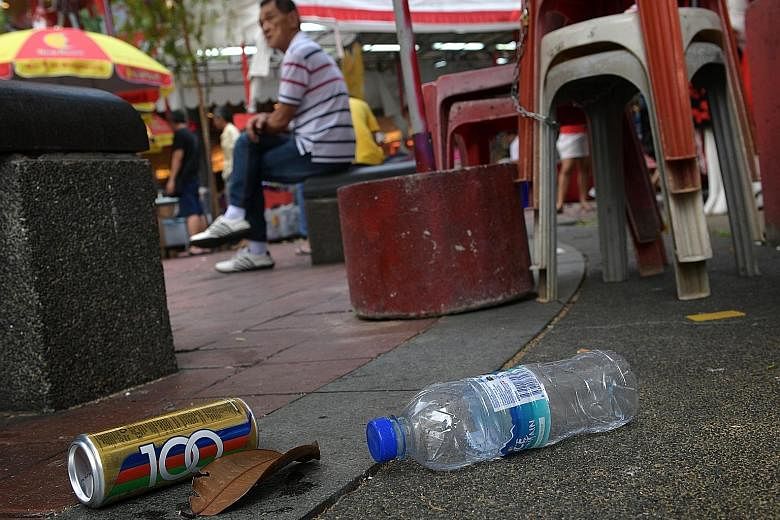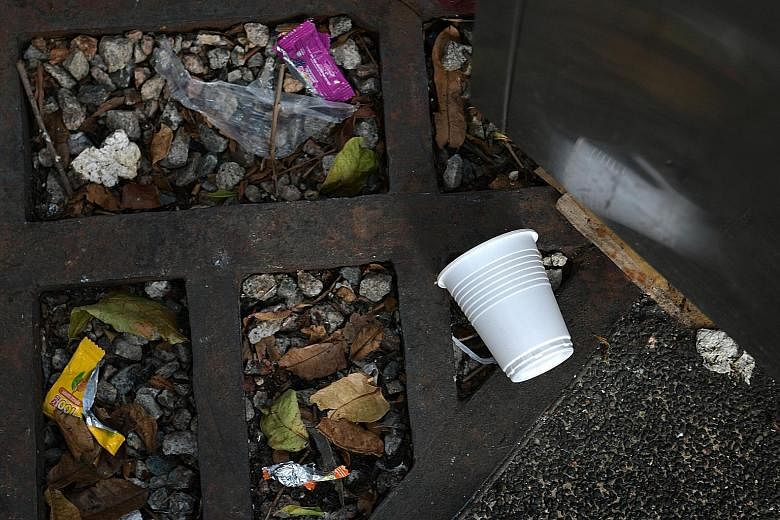The number of fines handed out for littering rose to a seven-year high last year.
The authorities meted out more than 31,000 fines, a 19 per cent jump from the more than 26,000 fines handed out in 2015.
Singapore residents accounted for more than six in 10 of those caught littering.
The news is even worse when compared with the numbers from 2014. Against the 20,000 tickets issued that year, last year's figure represents a staggering 55 per cent increase in the number of fines dished out by the National Environment Agency (NEA).
In addition, the NEA told The Sunday Times that more than 1,700 corrective work orders (CWOs) were imposed last year - more than in each of the previous five years.
Littering commonly occurs in neighbourhood centres and areas around hawker centres, MRT stations and shopping malls.
The number of fines meted out rose as enforcement efforts against littering were stepped-up in recent years.
In April 2014, the maximum fine for littering was raised to $2,000 for the first conviction, $4,000 for the second, and $10,000 for the third and subsequent convictions.
Public Hygiene Council chairman Edward D'Silva believes that there are many more litterbugs who were not caught. He said: "We need to revive the 'stick'. We have been going on the 'carrot' campaign for years, choosing to focus on education, but it seems to be falling on deaf ears."
When CWOs were introduced in 1992, offenders were made to clean public areas under the glare of the media spotlight, to deter would-be offenders.
While he does not advocate shaming individuals, Mr D'Silva said that having an enforcement blitz and displaying the number of people caught in the areacould serve as a wake-up call to residents.
"You wouldn't want your estate to be a littering hot spot," he said.
The number of fines given out each year has been on an upward trajectory since 2012.
In 2013, 9,346 tickets were issued for littering offences, up from 8,195 in 2012. It was 11,131 in 2011 and 23,898 in 2010.The number of CWOs imposed has also been on a similar trajectory since 2014. Over 1,300 were imposed in 2015, and there were 688 in 2014. The number of CWOs fell between 2010 and 2013, from 2,206 to 261.
Most litterbugs were caught discarding cigarette butts, tissue paper, cigarette box wrappers and plastic cups inappropriately.
The NEA said that they have also pushed on with educational efforts.
At major events, the organisers and the owners of the premises have to ensure that there are enough litter bins and that hosts regularly remind participants to dispose of their litter properly.
NEA added that it also "conducts regular roadshows at foreign workers' dormitories to raise awareness on acceptable social norms, such as not littering".
Since 2013, community volunteers have also been making the rounds to help nab litterbugs.
These volunteers have the power to get offenders to pick up and bin their rubbish. The volunteers can also record and hand their particulars over to the NEA if they refuse.
To date, more than 330 volunteers have been trained and they have engaged more than 3,700 offenders.
The chairman of the Government Parliamentary Committee for the Environment, Ms Lee Bee Wah, said people used to assume that uneducated seniors were the ones littering, and that Singapore would get cleaner as it progressed.
"But this trend proves otherwise. Even as Singaporeans become richer and more educated, some of them have lost their civic consciousness," she said.



